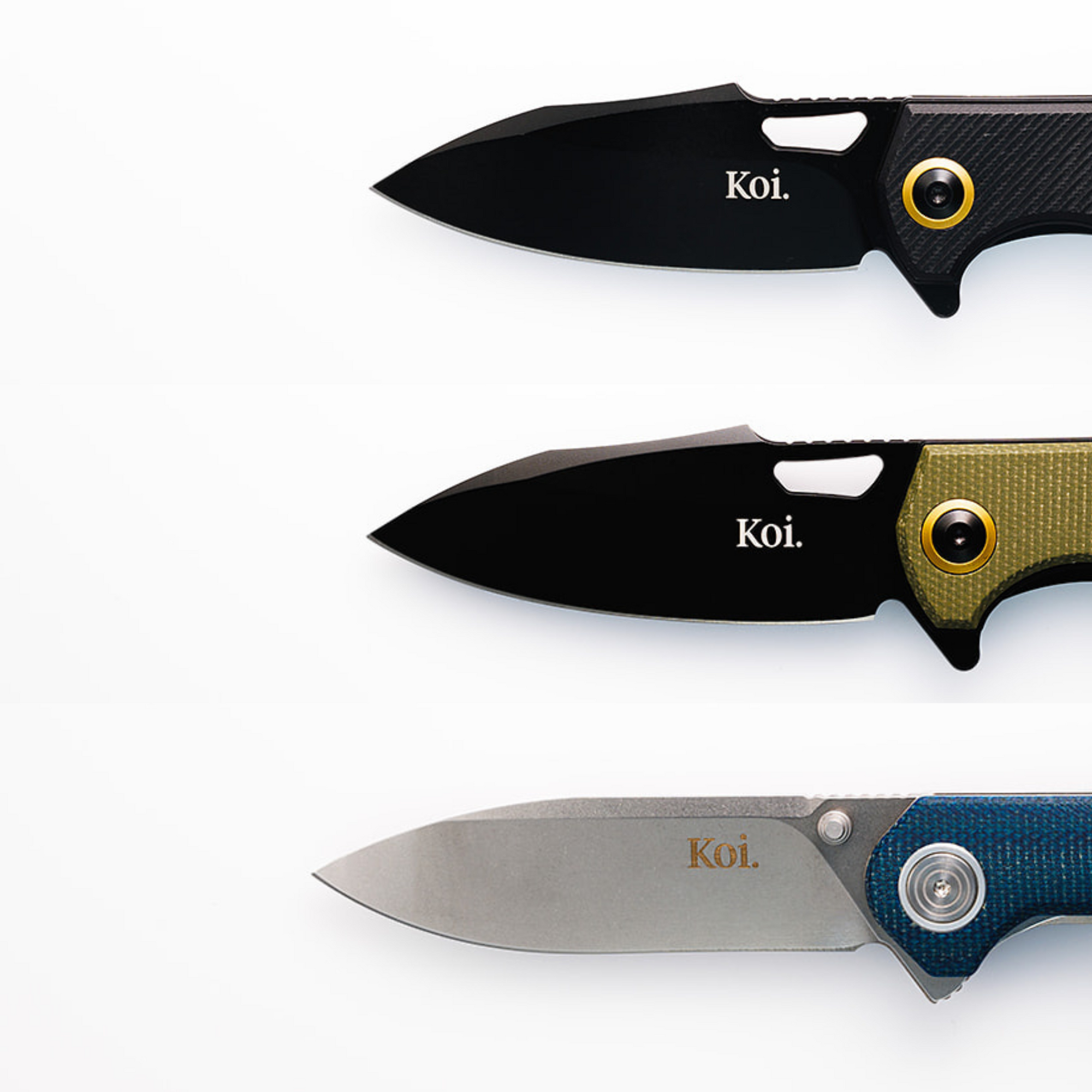D2 steel is a popular choice among knife makers due to its excellent edge retention and toughness combination. This steel was first introduced in the 1940s and has become a preferred choice for industrial applications such as die-cutting and forming. In the world of knife making, D2 steel has become increasingly popular due to its high carbon and chromium content.
Compared to other types of steel used in knife making, D2 steel has a superior ability to hold an edge and maintain its hardness. With its excellent performance and versatility, it's easy to see why D2 steel is the preferred choice for knife makers looking to create high-quality knives.
Koi Knives' pocket knife range is made with precision and durability in mind, featuring blades crafted from D2 steel. This high-carbon, high-chromium tool steel is known for its exceptional hardness and wear resistance, making it perfect for everyday use. Whether you're an outdoorsman or in need of a reliable everyday carry, Koi Knives' pocket knife collection is sure to impress.
Click here to view our full range of pocket knives made with D2 steel.

Composition of D2 Steel
D2 steel is a high-carbon, high-chromium tool steel with a composition that makes it one of the most popular steels for knife making. Its composition typically includes 1.5-2.35% carbon, 10-13% chromium, 0.5-1.0% molybdenum, 0.5% vanadium, and varying amounts of silicon, manganese, phosphorus, and sulphur.
The carbon content of D2 steel contributes to its hardness and wear resistance, while the high chromium content provides excellent corrosion resistance. Molybdenum enhances the toughness and machinability of the steel, while vanadium contributes to its wear resistance and hardness. Silicon and manganese improve hardenability, and phosphorus and sulphur are added to increase machinability.
Heat Treatment of D2 Steel
D2 steel is known for its excellent wear resistance and toughness, but achieving optimal performance in D2 steel knives depends on proper heat treatment. Heat treatment is the process of heating and cooling the steel to alter its properties.
In the case of D2 steel, the heat treatment process involves heating the steel to a high temperature and then quenching it in oil or air to cool it rapidly. This results in hard but brittle material.
The steel is tempered at a lower temperature to improve toughness and prevent brittleness. The tempering process reduces the hardness of the steel but increases its toughness, making it less prone to chipping or breaking.
Achieving optimal performance in D2 steel knives requires careful attention to the heat treatment process. Proper heating and cooling rates and precise temperature control during tempering are critical to achieving the desired properties in the steel.
Characteristics of D2 Steel Knives
D2 steel knives are a type of high-carbon, high-chromium tool steel widely used in the knife industry. They are known for their superior strength, durability, and excellent edge retention capabilities.
Durability and Wear Resistance
One of the most significant advantages of D2 steel knives is their durability and wear resistance. D2 steel is a tough material that can withstand significant impact and wear. It is resistant to chipping, cracking, and breaking, making it an ideal material for knives subjected to heavy use.
Edge Retention and Sharpening
Another notable characteristic of D2 steel knives is their edge retention. D2 steel can hold a sharp edge for an extended period, making it ideal for blades in demanding environments. However, sharpening D2 steel knives can be challenging due to their high hardness. It requires specialized sharpening tools and techniques to maintain its edge.
At Koi Knives, we offer sharpening and restoration services, as well as knife sharpening classes. Click here to learn more details.
In the video below, you will see our head blacksmith and designer, Shannon, take you through some handy hints about sharpening; honing rods vs. whetstones, stone grits, and proper technique.
Corrosion Resistance
While D2 steel knives are highly durable and resistant to wear, they are not as resistant to corrosion as other steel knives. D2 steel is not stainless steel; it can rust when exposed to moisture or acidic environments. Proper care and maintenance are essential to prevent rust and corrosion from damaging the knife.
Comparison to Other Knife Steels
D2 steel knives are often compared to other steel knives, such as stainless steel or carbon steel. While each type of steel has its advantages and disadvantages, D2 steel knives are unique in their high hardness, wear resistance, and edge retention capabilities.
Uses of D2 Steel Knives
D2 steel knives are popular among professional chefs because of their toughness, durability, and edge retention. They can withstand heavy use and are less likely to chip or break than other knives. D2 steel knives also have excellent edge retention, which means they can stay sharp for extended periods.
D2 steel knives are also ideal for outdoor camping, hunting, and fishing. They can easily cut through tough materials such as rope and branches and are less likely to break or chip than other knives. D2 steel knives are also highly resistant to rust and corrosion, making them ideal for wet environments.
Maintenance of D2 Steel Knives
Proper maintenance of D2 steel knives ensures they last long and perform optimally. You can keep your D2 steel knives in top condition by following the tips below.
Click here to see our tips on how to keep your knives at their best.
Cleaning D2 Steel Knives
Cleaning D2 steel knives after use is essential to prevent corrosion and damage. It would be best if you always cleaned your knife after every use. Here are the steps to follow when cleaning D2 steel knives:
- Wipe the knife blade with a clean cloth to remove food or dirt particles.
- Wash the blade with warm soapy water and rinse it with clean water.
- Dry the blade thoroughly with a clean cloth.
- Apply a small amount of oil to the blade to prevent corrosion.
Sharpening D2 Steel Knives
D2 steel knives require sharpening when the blade becomes dull. Here are the steps to follow when sharpening D2 steel knives:
- Use a sharpening stone with fine grit to sharpen the blade.
- Hold the knife blade at an angle of 15-20 degrees and move it along the sharpening stone in a circular motion.
- Repeat the process until the blade is sharp.
- Use a honing rod to maintain the sharpness of the blade
Storing D2 Steel Knives
Storing D2 steel knives properly is essential to prevent damage and maintain their sharpness. Here are some tips on how to store D2 steel knives:
- Store the knife in a sheath or blade guard to protect the blade.
- Keep the knife in a dry place to prevent corrosion.
- Avoid storing the knife with other metal objects as they can scratch the blade.
Common Misconceptions about D2 Steel Knives
Firstly, some people believe that D2 steel is not stainless. However, this is not true. While D2 is not considered a "stainless" steel, it does contain enough chromium to provide good corrosion resistance when properly heat treated and maintained.
Another common misconception is that D2 is a "chippy" steel prone to breaking or chipping during use. While it is true that D2 can be somewhat brittle if improperly heat treated, this is not the case when the steel is heat treated correctly. D2 can be very tough and durable steel when appropriately treated.
Some people also believe that D2 steel knives are difficult to sharpen. While D2 is a harder steel than others, such as 440C, it can still be sharpened with the right tools and techniques. It's essential to use a high-quality sharpening stone and to maintain a consistent angle throughout the sharpening process.
Wrap-up
D2 steel is a popular choice for knife enthusiasts and knifemakers. Despite its high carbon and chromium content, D2 steel is a tough and durable option for kitchen knives. Its high hardness makes it ideal for edge retention but it can be challenging to sharpen. To get the most out of D2 steel knives, it's important to use proper sharpening techniques and maintenance.
In conclusion, D2 steel knives are an excellent choice for kitchen knives, especially those who want a durable and long-lasting option. A D2 steel knife can provide years of reliable use with proper care and maintenance. For those interested in trying D2 steel knives, it's essential to research, find a reputable knifemaker or retailer, and invest in quality sharpening tools.
At Koi Knives, we're known for crafting premium pocket knives that are built to last. Our collection stands out thanks to the use of D2 steel in our blades. This high-carbon, high-chromium tool steel is renowned for its hardness and wear resistance, making our knives sharp and durable. By incorporating D2 steel, we've created a collection that looks great and performs exceptionally well. Trust us to provide you with the very best in pocket knives.



